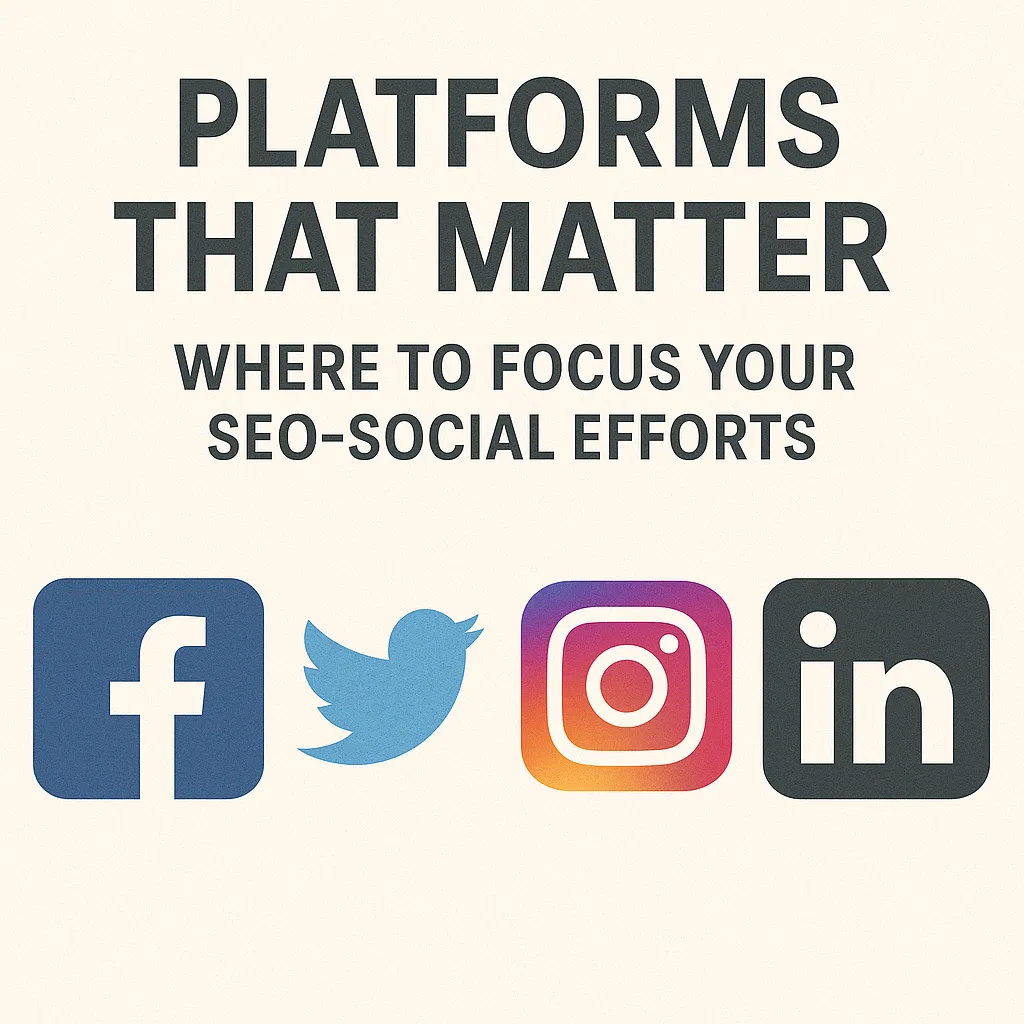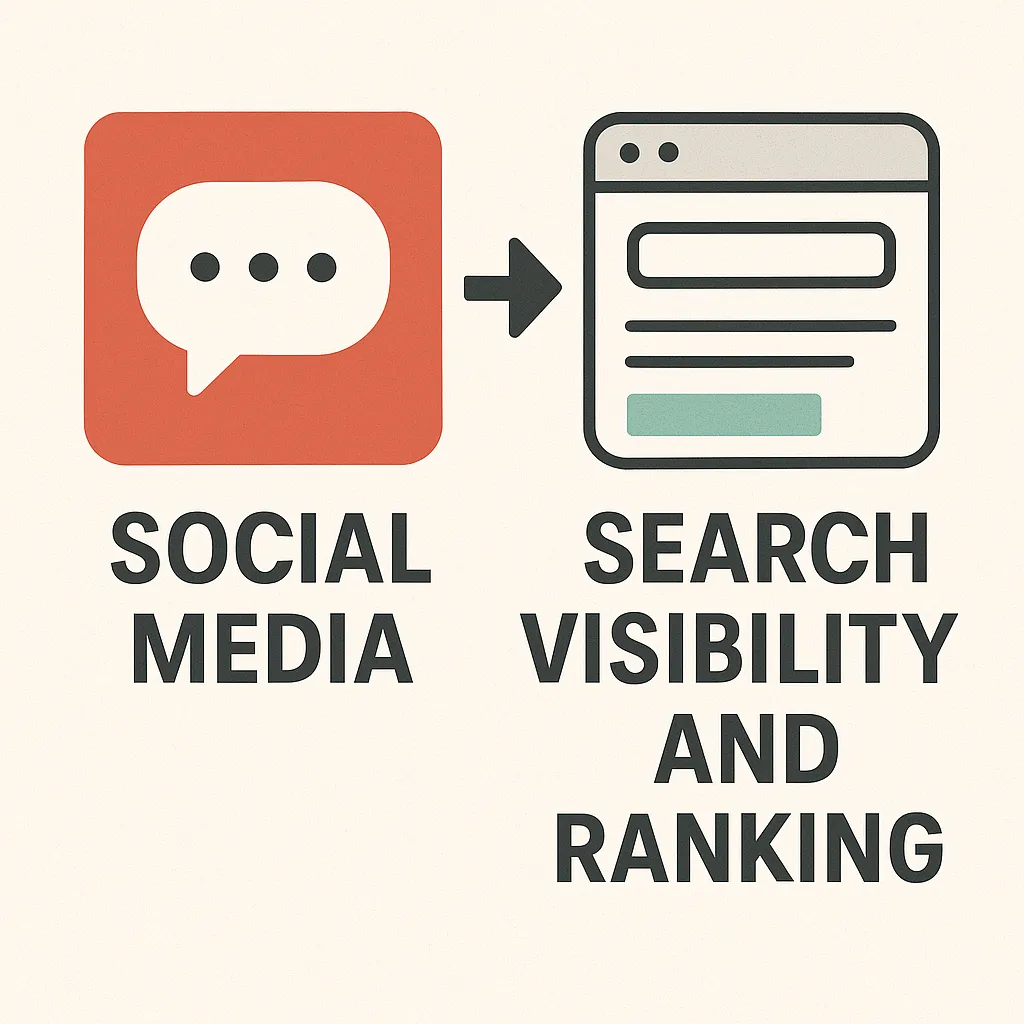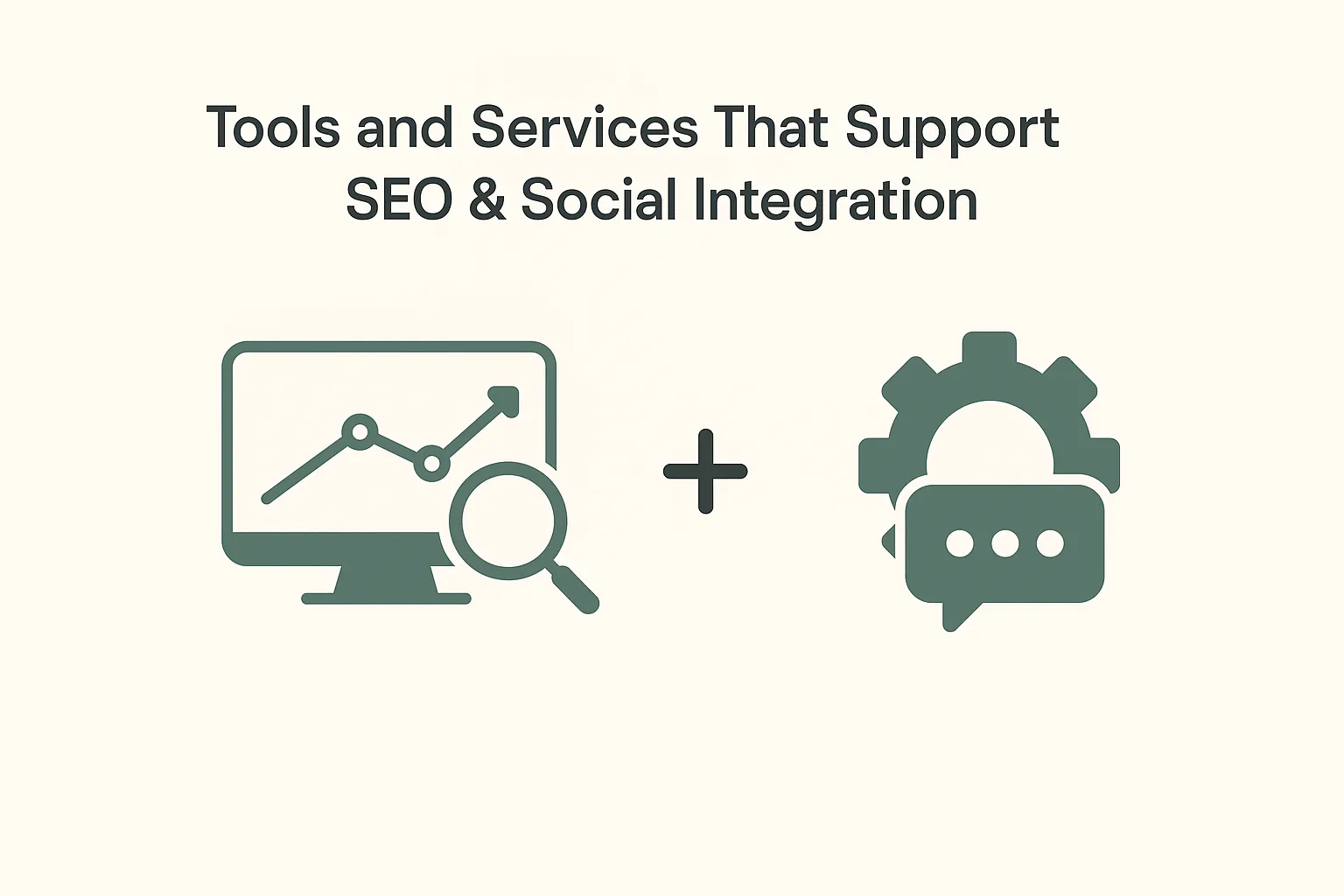In today’s digital ecosystem, the intersection of social media and SEO is more powerful than ever. While search engines don’t treat social platforms as direct ranking factors, strategic use of social media for SEO can significantly enhance visibility, traffic, and authority.
From social sharing SEO tactics to cross platform engagement, a well executed social SEO approach bridges content exposure and search engine performance. As brands shift towards integrated strategies, understanding how SEO and social work together becomes essential for long term growth.

1.Understanding the Connection Between Social Media and SEO
The relationship between social media and SEO has evolved significantly over the past decade. While social platforms don’t directly influence rankings in Google’s algorithm, their indirect impact on visibility, engagement, and authority cannot be overlooked. When done right, social media for SEO acts as a catalyst that amplifies your content's reach and builds relevance in the eyes of both users and search engines.
What Does social media and SEO Really Mean?
At its core, social media and SEO refers to how activity on platforms like Facebook, LinkedIn, Twitter, and Instagram can enhance your search engine visibility. It’s not about algorithms treating a "like" as a ranking factor but rather how social sharing SEO increases traffic, backlinks, and brand awareness.
Each time your content is shared, it has the potential to earn natural links, generate branded searches, and drive engagement all of which influence search performance.
The Evolution of SEO and social Integration
The connection between SEO and social has grown as user behavior shifted toward content discovery through feeds, stories, and reels. Modern SEO strategies now incorporate social content optimization to ensure that every shared post supports search discoverability.
Here’s how the integration has matured:
- SEO once focused solely on backlinks now, it embraces signals from social media for SEO like shares, clicks, and engagement
- Social platforms now function as search engines themselves (think TikTok, Pinterest, and LinkedIn search)
- Brands create campaigns that are designed for both search algorithms and social SEO traction simultaneously
The synergy has become less optional and more essential.
Myths vs. Reality: Does social media for SEO Actually Work?
A common myth is that social media has no effect on SEO since it’s not a “ranking factor.” Technically true but practically misleading. While Google doesn’t count likes or shares directly, social signals SEO still matter.
Here’s what social does help with:
- Increases content distribution, leading to more indexing
- Drives referral traffic, which supports site performance metrics
- Builds brand authority, encouraging backlinks from other sources
- Boosts visibility in niche communities and search results
So yes social media for SEO absolutely works. But it must be strategic, consistent, and aligned with your content and keyword goals.
2.How Social Media Impacts Search Visibility and Ranking
While social media platforms don’t directly influence Google's core ranking algorithm, their effect on content discovery, engagement, and link building opportunities plays a critical role in modern SEO. The indirect benefits of social media and SEO synergy can significantly improve visibility and search engine authority when leveraged strategically.

The Role of social signals SEO in Ranking Algorithms
Social signals SEO refers to measurable engagement metrics such as shares, likes, comments, and mentions on social platforms. Although Google has stated these aren’t direct ranking signals, their correlation with higher ranking pages is well documented.
These signals matter because they:
- Indicate content relevance and popularity
- Drive behavioral metrics like time on site and return visits
- Influence brand mentions and potential backlink opportunities
Search engines do track and evaluate how content performs across platforms. Consistent engagement in social media for SEO sends positive trust and authority signals even if not counted algorithmically.
How social sharing SEO Drives Traffic and Indexing
One of the most tangible ways social media for SEO boosts performance is by driving consistent, qualified traffic to your site. Every share or retweet exposes your content to new audiences, increases referral visits, and accelerates the content discovery process.
Benefits include:
- Faster indexing of new pages
- Greater likelihood of backlinks from readers who discover your content
- Improved brand visibility across different search verticals
Social sharing SEO acts as a distribution engine, pushing your content beyond your website and into broader online ecosystems.
Why Google Still Pays Attention to seo media Behavior
Despite the official stance on ranking signals, Google does take SEO media behavior into account especially when it comes to content relevance and user behavior patterns.
Here’s how:
- Pages that go viral often see increased crawl frequency
- Branded searches often spike following social campaigns
- Googlebot discovers URLs from public social profiles and links
In essence, social media and SEO efforts fuel each other. When your social content drives meaningful interaction, it strengthens the authority and performance of your web content in search.
3.Key Social Media Strategies to Improve SEO Performance
Aligning your social media content with SEO objectives requires more than just posting links. A well planned social SEO strategy integrates platform specific tactics with search focused goals to drive measurable impact. From post formatting to community engagement, the following approaches enhance both visibility and relevance.
Leveraging social content optimization for Better SERP Reach
Social content optimization ensures that what you share is not only engaging but also searchable and sharable. It involves:
- Using relevant keywords in captions, bios, and alt texts
- Writing SEO friendly post descriptions and titles
- Adding UTM tracking to monitor performance across search and social
When done consistently, social content optimization supports better crawlability and connects social activity to broader SEO metrics.
Building Brand Authority Through social seo
Social SEO also involves positioning your brand as an authoritative voice in your niche. Strong social presence leads to increased branded searches, more backlinks, and stronger trust signals all of which boost your SEO.
Key tactics include:
- Publishing expert level, sharable content
- Engaging with niche influencers and communities
- Maintaining consistent messaging across social and site content
Over time, this positions your brand to rank higher and convert better.
Optimizing Profiles and Posts for SEO and social media marketing
Your social profiles are often among the top results when people search for your brand. Optimizing them for SEO and social media marketing means:
- Using keyword rich bios and handles
- Linking back to high value landing pages
- Keeping NAP information (Name, Address, Phone) consistent for local SEO
These seemingly small details strengthen your credibility and unify your presence across channels. When your seo media and social signals align, search engines view your brand as more established and trustworthy.
4.Platforms That Matter: Where to Focus Your SEO Social Efforts
Not all social media platforms contribute equally to your SEO performance. Some channels are more effective at boosting visibility, engagement, and backlink opportunities than others. A smart social media and SEO strategy begins with understanding where your audience is and how each platform contributes to your broader digital footprint.
Using Facebook, Twitter, LinkedIn for social media for SEO
Platforms like Facebook, Twitter, and LinkedIn remain essential for most businesses. When used intentionally, they can boost your social media for SEO efforts by:
- Driving high volume referral traffic
- Amplifying blog and landing page visibility
- Creating engagement signals (likes, comments, shares)
They also offer rich profile customization and post metadata fields both useful for social content optimization.
Why Instagram and Pinterest Support social marketing SEO
Though not link friendly by default, Instagram and Pinterest still play a big role in social marketing SEO:
- Pinterest pins often get indexed in Google
- Instagram builds brand identity and drives branded searches
- Visual content increases click through rates when repurposed for blogs
Their strength lies in creating a strong visual presence that supports SEO indirectly, but meaningfully.
Choosing Platforms Based on Audience
Your platform selection should match your specific SEO and social media marketing objectives. For example:
- B2B = LinkedIn + Twitter
- eCommerce = Instagram + Pinterest
- Local Services = Facebook + Google Business + Instagram
Instead of trying to be everywhere, invest in 2–3 channels that align with your audience and support your social SEO growth consistently.
5.Measuring the ROI of Social SEO Efforts
For any business investing in social media and SEO, it’s critical to understand what’s working and what isn’t. While some results are qualitative (like brand awareness), others such as traffic, engagement, and conversions can and should be measured. A strong ROI framework ensures your social marketing seo efforts remain aligned with actual business outcomes.
Tracking Engagement and Visibility Gains
To start, measure the performance of your posts and campaigns from both a social and SEO lens:
- Click through rates (CTR) from social platforms to your site
- Increase in branded and long tail keyword searches
- Growth in backlink profiles through content amplification
- Rise in referral traffic from social sharing SEO
These metrics reveal how well your social SEO strategy is driving visibility and discoverability.
Tools to Measure Performance
Several tools can help you track social content optimization and performance across channels. The social media toolkit is especially useful for:
- Scheduling content and analyzing engagement
- Monitoring competitors’ social strategies
- Generating SEO reports based on social activity impact
Other useful tools include BuzzSumo, Hootsuite, Sprout Social, and Google Analytics all essential for full visibility into SEO media results.
Aligning social marketing SEO with Business KPIs
Ultimately, your SEO and social strategy should tie into broader business goals. This means tracking KPIs like:
- Cost per lead or cost per acquisition from social driven SEO traffic
- Increase in landing page conversions attributed to social media for SEO
- Sales uplift following viral or high engagement social content
By defining and reporting on the right KPIs, you can justify budget, refine strategy, and build momentum across both search and social ecosystems.
6.Tools and Services That Support SEO & Social Integration
Combining social media and SEO requires the right tools and expert support. Whether you’re managing everything in house or outsourcing parts of your digital strategy, having reliable systems in place ensures your efforts are measurable, scalable, and aligned with long term goals.

Overview of SEO and social media marketing services
Many agencies now offer integrated SEO and social media marketing services to streamline campaigns. These services typically include:
- Social content strategy aligned with keyword targets
- Profile optimization for branding and social content optimization
- Link building outreach enhanced by social distribution
- Tracking and reporting tools that unify SEO and social data
Choosing the right partner helps simplify execution across platforms while ensuring both your social SEO and ranking goals are met.
How social media Tools Automate Optimization
The social media toolkit is a favorite among digital marketers for good reason. It supports:
- Automated content scheduling across multiple platforms
- Performance benchmarking for each post and profile
- Integration with SEO campaigns for topic clustering and trend tracking
7.Actionable Tips to Strengthen Your Social SEO Strategy
Bringing together social media and SEO isn’t just about visibility it’s about execution. The most successful strategies rely on consistency, smart formatting, and cross channel synergy. Whether you're just getting started or refining your approach, these tips will strengthen your social seo foundation.
Consistency and Timing in social sharing SEO
Consistency in posting frequency and timing builds momentum in social sharing SEO. Here’s how to make it work:
- Develop a content calendar that aligns with keyword and campaign goals
- Post during high engagement windows for each platform
- Re share evergreen content that supports core SEO and social themes
- Include branded hashtags and short form links with UTM tags
This repetition and rhythm help establish presence, promote indexation, and drive referral traffic.
Cross Channel Linking and UTM Strategy
Your SEO media should never exist in silos. Link content across platforms and track the impact:
- Use UTM parameters to monitor performance from each social source
- Link social posts to high value landing pages (not just homepages)
- Tag URLs to segment data by campaign, platform, and audience
When implemented properly, these tactics reveal exactly how social marketing SEO is contributing to conversions and visibility.
Repurposing Content Across Platforms
One powerful tactic in social content optimization is repurposing. A single blog post can fuel:
- Quote cards on Instagram
- Infographic summaries on Pinterest
- LinkedIn slideshows
- Twitter threads
- Video recaps or Q&A reels
This approach increases engagement, strengthens brand recognition, and broadens the reach of your core keywords boosting both SEO and social media impact in one strategy.
8.Final Thoughts: Making Social Media Work for Your SEO Goals
The integration of social media and SEO is no longer a nice to have it's a competitive necessity. While search engines may not directly reward social engagement with rankings, the indirect benefits of social SEO are undeniable: increased visibility, brand authority, and content reach.
When done right, social marketing SEO becomes a scalable asset in your digital ecosystem.
When to Prioritize social media for SEO Over Other Channels
Not every brand needs to go all in on every channel. You should invest more heavily in social media for SEO when:
- You’re launching content that needs rapid distribution
- You want to build thought leadership and credibility
- You’re targeting branded search and link acquisition
This is particularly useful for startups, personal brands, and agencies looking to boost visibility without a huge backlink budget.
Long Term Synergy Between SEO and social media marketing
The real value comes from sustained alignment. By syncing your SEO roadmap with your social content optimization plan, you amplify every campaign across platforms.
Examples of synergy include:
- Sharing blog content that targets long tail keywords
- Using social media toolkit to analyze audience engagement
- Retargeting social users with content upgrades tied to SEO media
This unified approach turns each platform into a growth engine.
Building an Agile, Data Driven social SEO Strategy
The best SEO and social strategies aren’t rigid they’re adaptive. Build your approach around real data:
- Use engagement metrics to inform your next content calendar
- Rely on keyword trends to guide what you promote socially
- A/B test different formats across channels and refine accordingly
With the right mindset, your social sharing SEO will keep evolving, learning from user behavior, and continuously contributing to your search performance.
9.Summary
The connection between social media and SEO continues to grow in both complexity and importance. While social platforms don’t directly impact rankings through likes or shares, they play a crucial role in driving visibility, building authority, and creating engagement that search engines do notice.
A well executed social SEO strategy leverages content distribution, social sharing SEO, and brand engagement to generate more backlinks, increase site traffic, and enhance online presence. Whether you're using social media for SEO campaigns, integrating tools like the social media toolkit, or optimizing your profiles through social content optimization, the synergy between channels is clear.
Incorporating consistent, platform specific tactics aligned with your SEO and social media marketing goals helps ensure long term success in an ever evolving digital ecosystem. With the right balance of creativity, data, and execution, social media becomes a high impact pillar of your overall SEO performance.

